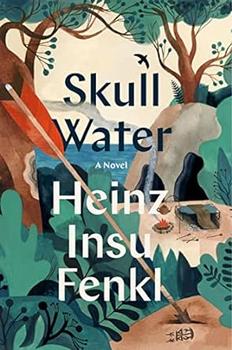Summary | Excerpt | Reviews | Beyond the Book | Readalikes | Genres & Themes | Author Bio

A Novel
by Heinz Insu FenklExcerpt
Skull Water
The shadow of the 707 rippled like a giant black egret as the hilly contours below us became the flat green expanse of the rice paddies around Kimpo Air Base. I could not imagine what power it took to keep these tons of alloy and steel in the air, to keep the plane from plummeting like a stone into the fertile earth below. We were falling at more than two hundred miles an hour, and yet the landscape moved lazily until the plane slowed, just before touching the runway, and then everything seemed to accelerate with a dizzying speed. The world lurched and the air grew suddenly thick with the roar of the jet engines, and we could feel the sudden roughness of the tarmac through the landing gear, right through the bottoms of our seats, as the earth ground itself up into our spines.
As the airplane braked to a near stop, everything outside looked at once too large and yet oddly too small. I glanced over my little sister's head to the aisle seat and saw my mother's eyes brim with tears of joy at being back in our homeland.
Korea. 1974. Early summer in the Year of the Tiger.
The taxi driver from Kimpo said he could take the new highway, but my mother asked him to take the old road that had been the route 4 Skull Water for the U.S. Army buses we used to ride. Through mile after mile of chain-link fences, the American and Korean military posts we drove past were just as I remembered them. Where the road used to turn to gravel, the odd Purina Chows sign in English was still there, its red-and-white checkered squares faded, the lower right corner burnt—scars of a year's weathering.
We were going to live in Kisu's house, in the same neighborhood where we had lived before leaving for Germany, and when the taxi pulled up outside the wooden gate with its faded tri-color t'aeguk symbol next to the tailor shop, I felt a strange mix of ease and fatigue.
At first, Kisu's house appeared exactly the same as when I had last seen it a year earlier. And yet during our first day back I realized that the house had aged just as Kisu's grandmother Halmoni had; she had grown lighter and more shriveled, like a dried gourd that will rattle in the wind. It was a ramshackle house nearly a hundred years old now, built decades before the Japanese occupation, and since then, as the tiny village by the stream had grown into Pupyong, it had sheltered four generations of Changs. The original building was wood and whitewashed plaster, but now the roof beams were full of dry rot and the kidung posts were warped and tilted. When I walked across the wooden maru with the added weight of my year away, the floor creaked in spots I didn't recall, and the compacted dirt of the courtyard, which had always seemed as hard as baked clay, seemed to have become softer, dustlike. The black dirt floor of the kitchen was special—people from the neighborhood would visit from time to time to scoop up a few spoonfuls of it to make medicine pellets, which they would take with foul-smelling concoctions of Chinese herbs. Now, though I had grown taller, it seemed somehow even lower than before.
For the first few months after our return to Korea, we would live in this house in Pupyong in the old neighborhood of Tatagumi, which still bore its Japanese name, in the very same rooms we had occupied One Big Word 5 before; my mother, my sister An-na, and I all slept in the room where I had been born.
The first morning I stepped outside the front gate, I was startled by the red cock that guarded the tailor shop next door. It stood alert, jerking its head this way and that, clucking deep within its throat. Seeing me, it aimed its gaze, which was no less sharp than its knife-sharp beak. I retreated slowly, and suddenly I felt as if I were back in time. When we were last here, there had been a cock just like this one, with the same twitchy movements, the same red-black-and-orange sheen to its feathers. Perhaps this was the son or the grandson of that one—surely it could not have been the same bird. My cousin Yongsu had once come home with a small sack of rice from the corner store and the cock had attacked him for daring to pass without feeding him. Yongsu had nearly lost an eye that time, and forever after that he and I made sure to toss a clump of dried rice or a crust of old sandwich bread to distract the bird when we left or returned to the house. Kisu's mother joked that they had never been burglarized since the tailor started raising his fighting cocks.
Excerpted from Skull Water by Heinz Insu Fenkl. Copyright © 2023 by Heinz Insu Fenkl. Excerpted by permission of Spiegel & Grau. All rights reserved. No part of this excerpt may be reproduced or reprinted without permission in writing from the publisher.
Your guide toexceptional books
BookBrowse seeks out and recommends the best in contemporary fiction and nonfiction—books that not only engage and entertain but also deepen our understanding of ourselves and the world around us.